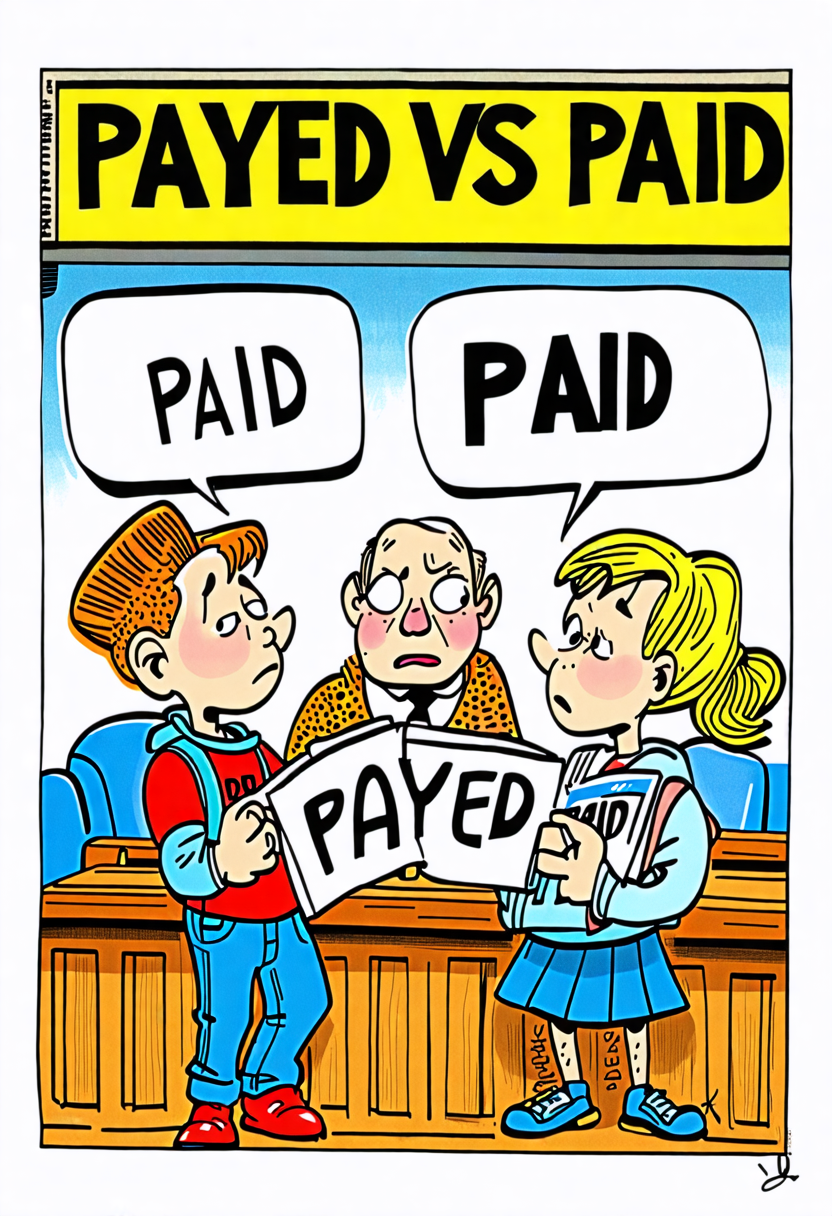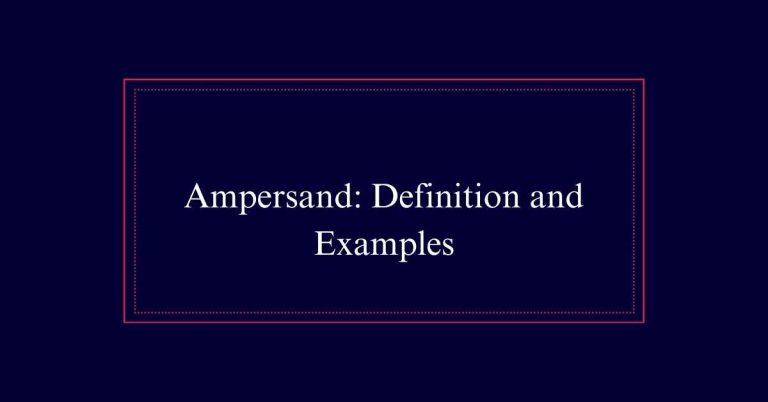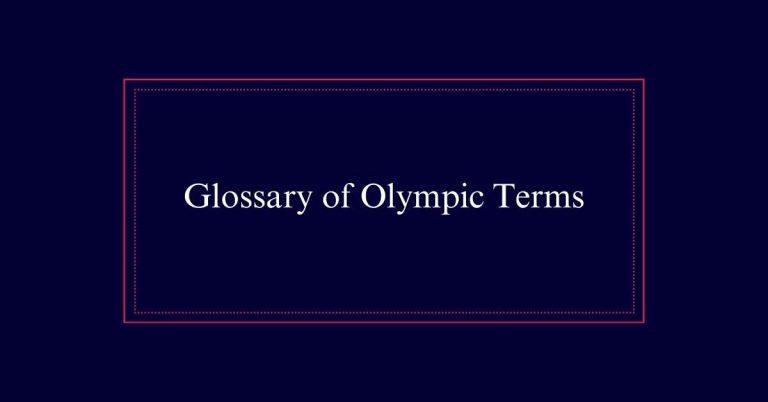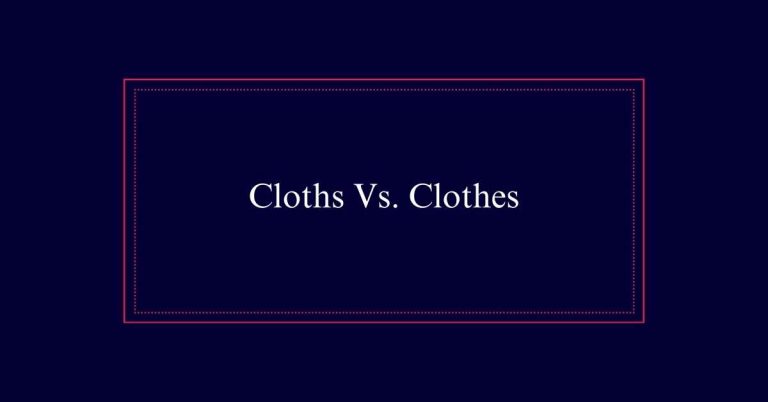Payed Vs. Paid
You should use ‘paid’ for most situations. It’s the correct past tense of ‘pay’ and is used in financial contexts, like paying bills or buying groceries. ‘Payed,’ however, is a rare term used in nautical settings, for tasks like waterproofing ship seams or handling ropes. Using ‘paid’ keeps things clear and professional in everyday and business communication.
Definition of ‘Paid’
The word ‘paid’ is the correct past tense form of ‘pay’ when you’re talking about financial transactions. You use ‘paid’ when you refer to actions like settling a bill, paying for groceries, or giving someone money for services.
For example, ‘I paid the rent yesterday’ or ‘She paid for her coffee.’ This form is widely recognized and understood in everyday language and business contexts. ‘Paid’ is also used in phrases like ‘paid attention’ or ‘paid respect,’ extending beyond just money.
Definition of ‘Payed’
You use ‘payed’ in specific nautical contexts. It’s not a common term in everyday language. When you’re dealing with ships and sailing, ‘payed’ refers to actions like waterproofing seams or allowing a ship to drift with the wind.
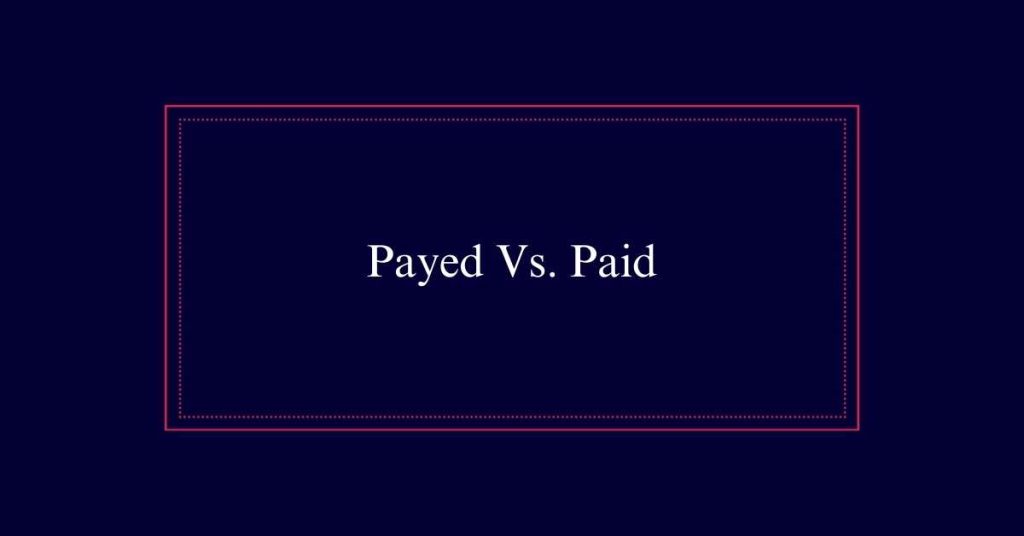
For example, when sailors ‘pay’ the seams, they apply tar or pitch to make them watertight. Another use is when you let out a rope or chain, known as ‘paying out’ the line.
Financial Use of ‘Paid’
When dealing with money, always use ‘paid’ as the correct past tense of ‘pay’. If you bought something or settled a bill, you’d say, “I paid the amount.” It’s important to remember that ‘paid’ covers all financial transactions.
Whether it’s for services, goods, or dues, ‘paid’ is the word you should use. For example, you might say, “I paid my rent last week,” or “She paid for dinner.” Incorrectly using ‘payed’ in these situations can confuse your reader. Stick with ‘paid’ to keep your writing clear and professional.
Anytime money is involved, ‘paid’ is your go-to past tense form. This maintains you communicate effectively and correctly in financial contexts.
Nautical Use of ‘Payed’
In nautical contexts, ‘payed’ often refers to waterproofing a ship’s joints or letting out ropes. It’s a specialized term used in sailing and ship maintenance.
When you’re on a ship, you might encounter ‘payed’ in these ways:
- Waterproofing: Applying pitch or tar to seal the ship’s seams.
- Rope Handling: Letting out ropes or anchor chains.
- Ship Direction: Allowing a ship to veer off the wind.
These uses are unique to maritime activities, so don’t confuse ‘payed’ with ‘paid’ in everyday transactions. Understanding this distinction helps you use the terms correctly.
Always remember, ‘payed’ is mainly for nautical purposes, while ‘paid’ is for financial matters.
Common Errors in Usage
Many people mistakenly use ‘payed’ instead of ‘paid’ in everyday writing and conversation. It’s an easy error to make, but ‘paid’ is almost always the correct choice. When you talk about money, bills, or compensation, use ‘paid.’ For example, ‘I paid the bill’ is correct. Using ‘payed’ under these circumstances is wrong.
‘Payed’ is only correct within specific nautical settings, like ‘The sailor payed out the rope.’ This is rare in day-to-day language. To avoid mistakes, remember: use ‘paid’ for anything financial or general, and reserve ‘payed’ for nautical terms.
Origins of the Word ‘Pay’
The word ‘pay’ originates from the Latin verb ‘pacare,’ which means to pacify or make peace. This root word evolved over time, and in modern English, it mainly refers to financial transactions.
When you think about paying for something, you’re basically settling a debt or making peace through money.
Here’s a quick breakdown of how the word ‘pay’ is used today:
- Financial Transactions: You pay for goods, services, or bills.
- Attention: You pay attention in class or to details.
- Respect: You pay respect at a ceremony or to someone’s achievement.
Nautical Meanings Explained
While ‘paid’ is common for financial transactions, ‘payed’ has specific nautical uses. When you’re dealing with ships and sailing, ‘payed’ means to waterproof a surface.
Sailors often ‘payed’ the seams of a boat to keep water out. Another nautical use is when you ‘pay’ out a rope or chain, meaning you let it out gradually. This is vital for tasks like anchoring.
‘Payed’ can also mean allowing a ship to drift leeward due to the wind. These are specialized terms you won’t use every day unless you’re in the maritime field.
Examples of Correct Usage
Using ‘paid’ or ‘payed’ correctly depends on whether you’re talking about money or nautical actions.
Here are some examples to help you:
- Financial Transactions:
‘I paid $50 for the concert ticket.’
Use ‘paid’ when referring to any monetary exchange.
- Respect or Attention:
‘They paid their respects at the memorial.’
Again, ‘paid’ is the correct form when discussing non-financial contexts like respect or attention.
- Nautical Context:
‘The sailor payed out the rope.’
Use ‘payed’ only when dealing with specific nautical activities.
Irregular Verb Forms
You’ve seen how ‘paid’ and ‘payed’ are used in different contexts, so let’s explore how ‘pay’ fits into the broader category of irregular verbs. Irregular verbs don’t follow the usual rules for past tense forms. ‘Pay’ is one of these. Instead of ‘payed’, you use ‘paid’ for most meanings. Here’s a quick look at some other irregular verbs:
| Present | Past | Past Participle |
|---|---|---|
| pay | paid | paid |
| go | went | gone |
| buy | bought | bought |
| speak | spoke | spoken |
| eat | ate | eaten |
